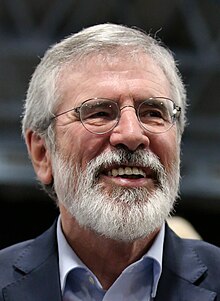
Back Gerry Adams Afrikaans جيري آدمز Arabic جيرى آدمز ARZ Cerri Adams Azerbaijani Джэры Адамс Byelorussian Джэры Адамз BE-X-OLD Джери Адамс Bulgarian জেরি এডামস Bengali/Bangla Gerry Adams Breton Gerry Adams Catalan
Gerry Adams | |
|---|---|
 Adams in 2018 | |
| President of Sinn Féin | |
| In office 13 November 1983 – 10 February 2018 | |
| Vice President |
|
| Preceded by | Ruairí Ó Brádaigh |
| Succeeded by | Mary Lou McDonald |
| Leader of Sinn Féin in Dáil Éireann | |
| In office 9 March 2011 – 10 February 2018 | |
| Preceded by | Caoimhghín Ó Caoláin |
| Succeeded by | Mary Lou McDonald |
| Teachta Dála for Louth | |
| In office February 2011 – February 2020 | |
| Member of the Legislative Assembly for Belfast West | |
| In office 25 June 1998 – 7 December 2010 | |
| Preceded by | Constituency established |
| Succeeded by | Pat Sheehan |
| Member of Parliament for Belfast West | |
| In office 1 May 1997 – 26 January 2011 | |
| Preceded by | Joe Hendron |
| Succeeded by | Paul Maskey |
| In office 9 June 1983 – 16 March 1992 | |
| Preceded by | Gerry Fitt |
| Succeeded by | Joe Hendron |
| Personal details | |
| Born | Gerard Adams 6 October 1948 Belfast, Northern Ireland |
| Political party | Sinn Féin |
| Spouse |
Collette McArdle (m. 1971) |
| Children | 1 |
| Parent |
|
| Education | St. Mary's CBS, Belfast |
| Website | sinnfein |
Gerard Adams (Irish: Gearóid Mac Ádhaimh;[1] born 6 October 1948) is an Irish republican politician who was the president of Sinn Féin between 13 November 1983 and 10 February 2018, and served as a Teachta Dála (TD) for Louth from 2011–2020.[2][3] From 1983–1992 and from 1997–2011, he won election as a Member of Parliament (MP) of the British Parliament for the Belfast West constituency but followed the policy of abstentionism.
Adams first became involved in Irish republicanism in the late 1960s, and was an established figure in Irish activism for more than a decade before his 1983 election to Parliament this was as leader of the Belfast Brigade in the Irish Republican Army. In 1984, Adams was seriously wounded in an assassination attempt by the Ulster Defence Association (UDA).[4] From the late 1980s onwards, he was an important figure in the Northern Ireland peace process, entering into talks initially with Social Democratic and Labour Party (SDLP) leader John Hume and then subsequently with the Irish and British governments.[5] In 1986, he convinced Sinn Féin to change its traditional policy of abstentionism towards the Oireachtas, the parliament of the Republic of Ireland. In 1998, it also took seats in the power-sharing Northern Ireland Assembly. In 2005, the Provisional Irish Republican Army (IRA) stated that its armed campaign was over and that it was exclusively committed to peaceful politics.[6]
Adams has often been accused of being a member of the IRA leadership in the 1970s and 80s, though he consistently denied any involvement in the organisation. In 2014, he was held for four days by the Police Service of Northern Ireland for questioning in connection with the 1972 abduction and murder of Jean McConville.[7][8] He was released without charge and a file was sent to the Public Prosecution Service for Northern Ireland,[9] which later stated there was insufficient evidence to charge him.[10][11][12] Adams announced in November 2017 that he would step down as leader of Sinn Féin in 2018, and that he would not stand for re-election to his seat in Dáil Éireann in 2020.[13] He was succeeded by Mary Lou McDonald at a special ardfheis (party conference) on 10 February 2018.[14]
- ^ "Cairt Chearta do Chách" (in Irish). Archived from the original on 18 November 2007. Retrieved 30 November 2006.
{{cite web}}: CS1 maint: bot: original URL status unknown (link) Sinn Féin press release, 26 January 2004. - ^ "Gerry Adams". Oireachtas Members Database. Archived from the original on 7 November 2018. Retrieved 28 December 2018.
- ^ "Gerry Adams". ElectionsIreland.org. Archived from the original on 3 August 2020. Retrieved 6 March 2011.
- ^ "1984: Sinn Fein leader shot in street attack". BBC: On This Day. 14 March 1984. Archived from the original on 29 October 2019. Retrieved 3 May 2014.
- ^ "Irish Genealogy, Customs & Roots". IrishCentral.com. Archived from the original on 6 January 2014. Retrieved 2 May 2014.
- ^ "Full text: IRA statement". The Guardian. London. 28 July 2005. Archived from the original on 23 September 2021. Retrieved 17 March 2007.
- ^ Sinn Féin leader Gerry Adams held over Jean McConville murder Archived 21 August 2018 at the Wayback Machine, BBC News. Retrieved 30 April 2014.
- ^ Gerry Adams remains in custody over McConville murder Archived 1 December 2017 at the Wayback Machine, BBC News, 1 May 2014.
- ^ "Timing of arrest wrong says Adams". BBC News. 4 May 2014. Archived from the original on 27 July 2018. Retrieved 22 June 2018.
- ^ "Jean McConville murder: Sinn Féin leader Gerry Adams will not face Disappeared charges" Archived 20 February 2018 at the Wayback Machine. BBC News, 29 September 2015.
- ^ Cite error: The named reference
BBC-Insuff01was invoked but never defined (see the help page). - ^ Cite error: The named reference
Mirror-Insuff01was invoked but never defined (see the help page). - ^ Doyle, Kevin (18 November 2017). "Gerry Adams to step down as Sinn Féin leader in 2018". Irish Independent. Archived from the original on 19 November 2017. Retrieved 19 November 2017.
- ^ "Mary Lou McDonald confirmed as new leader of Sinn Féin". The Irish Times. Archived from the original on 10 July 2018. Retrieved 20 January 2018.